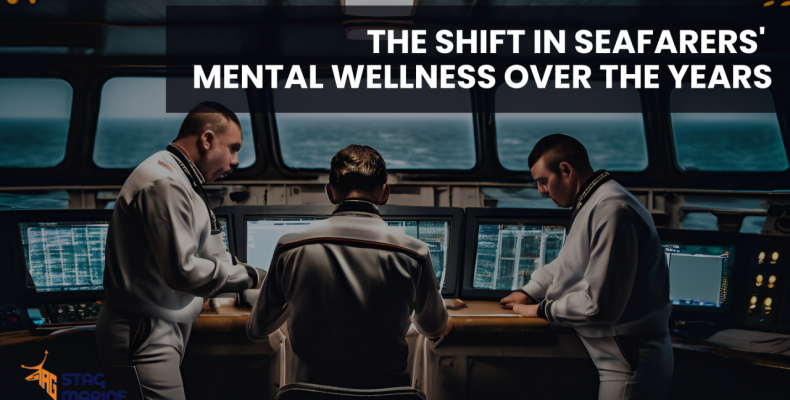The maritime industry is a high-risk and demanding field, where seafarers face unique physical and psychological challenges. The nature of their work, often involving long hours at sea, isolation, and the need to maintain constant vigilance, significantly impacts their psychophysiological well-being. Understanding the effects of work shifts on seafarers’ mental and physical health is crucial for ensuring their safety and improving overall work conditions. This paper aims to analyze how extended work periods affect the psychophysiological condition of seafarers, exploring both the psychological and physical implications.
Psychophysiological State: Definition and Importance
The term psychophysiological state refers to the combined assessment of an individual’s psychological and physiological condition. This encompasses mental health aspects such as stress, anxiety, and depression, as well as physical health concerns such as sleep disorders, fatigue, and cardiovascular health. In the context of seafaring, the work environment, shift durations, and environmental conditions all play a pivotal role in shaping the psychophysiological state of seafarers.
Psychological Effects of Extended Work Shifts
Seafarers often work under extreme conditions, spending long periods away from home and facing a physically and mentally demanding environment. The extended work shifts common in maritime operations can have a significant impact on their psychological well-being. The following psychological effects are often observed:
- Stress and Anxiety: The inherent uncertainty of working at sea, coupled with exposure to dangerous weather conditions and high-risk operational tasks, can increase stress levels. Additionally, limited communication with family and friends exacerbates feelings of anxiety, particularly when separation from loved ones is prolonged.
- Depression: Prolonged isolation, limited social interaction, and the arduous nature of the job can cause the development of depressive symptoms. Seafarers often report feeling disconnected from the outside world, leading to emotional strain that may persist even after returning home.
- Sleep Disorders: The demanding work schedule and irregular hours disrupt the seafarer’s circadian rhythm, leading to sleep deprivation and related disorders. Inadequate sleep not only impacts mental clarity and decision-making but also diminishes the ability to handle stress and maintain focus during critical operations.
Physical Effects of Extended Work Shifts
In addition to psychological impacts, long working hours at sea also pose several physical health risks. The physical strain associated with maritime work, combined with environmental factors such as exposure to harsh weather conditions, can lead to a range of health issues:
- Physical Fatigue: Continuous work shifts, often requiring heavy lifting and repetitive tasks, can result in severe physical fatigue. This can negatively impact a seafarer’s ability to perform essential duties, increasing the risk of accidents and injuries.
- Cardiovascular Issues: Chronic stress, irregular sleep patterns, and physical strain are known to contribute to cardiovascular problems. Studies have shown that seafarers may experience an elevated risk of heart disease due to the cumulative effects of these factors over time.
- Musculoskeletal Disorders: The nature of maritime work often involves working in confined spaces and performing physically demanding tasks, which can result in musculoskeletal disorders. Back pain, joint pain, and other musculoskeletal issues are common among seafarers, often exacerbated by the lack of adequate rest and physical rehabilitation during long voyages.
Impact on Social and Family Life
The nature of maritime work also affects seafarers’ social lives and family relationships. The extended periods spent away from home and the difficulty in maintaining communication with family members can create additional psychological stress:
- Family Relationships: Long absences from family members can strain relationships and may contribute to feelings of guilt and emotional distress. Partners and children may also experience anxiety and depression due to the absence of the seafarer, leading to further stress on the individual.
- Social Isolation: Seafarers typically spend most of their time on ships with a limited social circle, often isolated from their broader communities. This isolation can lead to feelings of loneliness and hinder their ability to engage in meaningful social interactions, which are vital for emotional well-being.
Managing Work Shifts: Strategies for Improving Seafarers’ Health
Given the substantial impact of work shifts on the psychophysiological health of seafarers, several strategies can be employed to mitigate these effects and improve overall well-being:
- Training and Awareness: Educating seafarers about stress management techniques, sleep hygiene, and physical health maintenance is critical. Providing resources on how to cope with isolation and maintain mental health during extended voyages can help seafarers better manage the psychological demands of their work.
- Improved Work Conditions: Adjusting work schedules and shift patterns to ensure a balance between work and rest periods can alleviate physical and mental strain. Implementing rest days and reducing continuous work shifts may help reduce fatigue and stress levels.
- Technological Support: Advances in technology, such as satellite communication and internet access, can significantly improve communication between seafarers and their families. Ensuring regular contact with loved ones can reduce feelings of isolation and anxiety, enhancing emotional well-being.
- Psychological Support Services: Providing access to mental health resources, such as counseling and therapy, both on board and through remote support, can help seafarers manage psychological stress. Offering confidential and accessible mental health services is essential for addressing issues such as depression, anxiety, and loneliness.
Conclusion
The effects of extended work shifts on the psychophysiological state of seafarers are profound, influencing both their mental and physical health. The unique challenges faced by seafarers, including long working hours, isolation, and physical demands, require comprehensive strategies to mitigate their negative effects. By implementing better work practices, supporting mental health, and fostering communication with families, the well-being of seafarers can be improved. Furthermore, creating a supportive work environment is crucial not only for the health of the individual seafarer but also for the overall safety and efficiency of maritime operations
